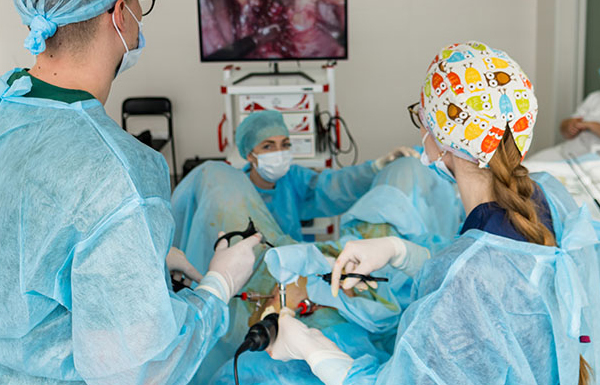Dr. Sankar Dasmahapatra
Laparoscopic Surgery Specialist in Kolkata, India
DGO, MS, Fellowship in Gynaecological Lap Surgery (Sydney -Australia)
Consultant Gynaecologist & Obstetrician
Infertility Specialist & Lapaoscopic Surgeon
DGO, MS, Fellowship in Gynaecological Lap Surgery (Sydney -Australia)
Consultant Gynaecologist & Obstetrician
Infertility Specialist & Lapaoscopic Surgeon
by Dr. Sankar Dasmahapatra

Is endometriosis surgery a major surgery?
Historically, surgeons performed open surgery — which requires a large incision across your abdomen — to remove endometriosis. Today, however, almost everyone who needs endometriosis surgery can have laparoscopy, a minimally invasive surgery which only requires small incisions.
Can we survive with endometriosis?
Pain medications and management techniques can help you live with endometriosis. Hormone therapy can also slow the growth and help reduce your pain. However, none of these treatments will cure existing endometriosis.
What happens if endometriosis is left untreated?
Untreated endometriosis can cause pain, bloating, excess menstrual bleeding, digestive distress, and can also affect a person's fertility. When endometriosis tissue grows outside the uterus, it can affect other organs — especially the ovaries and reproductive
Is endometriosis surgery high risk?
With laparoscopy for endometriosis, problems are rare but can be severe. They include: Infection in the bladder, uterus or cuts on the abdomen. Bleeding – (one in five hundred)
Can endometriosis be cancerous?
While there are concerns about how endometriosis impacts cancer, it is not a cancerous condition. Abnormal tissues growing outside the uterine lining are not cancerous. However, endometriosis can cause several complications that can increase a person's risk of cancer.
Can endometriosis return after surgery?
Although surgery for endometriosis can improve pain and fertility, the risk of disease recurrence is high.
Who is at highest risk for endometriosis?
Studies show that women are at higher risk for endometriosis if they: Have a mother, sister, or daughter with endometriosis. Started their periods at an early age (before age 11) Have short monthly cycles (less than 27 days)
Can endometriosis go away by itself?
There is no cure for endometriosis. In some cases, however, the condition resolves on its own, without treatment. Hormone therapy can slow the progression of the condition and reduce pain, and surgical procedures can lessen pain. But symptoms often recur after these treatments.
Can I live a long life with endometriosis?
While they are unlikely to be fatal, they can have a negative impact on your quality of life. Untreated endometriosis can lead to a variety of complications, including: Pain that lasts for a long time. Endometriosis can cause pain in the areas it affects as well as in other parts of the body
How can I permanently stop endometriosis?
There is currently no cure for endometriosis, but there are treatment options for related pain and infertility. Healthcare providers consider several factors when determining the best treatment for endometriosis symptoms, including: Your age. How severe your symptoms are.